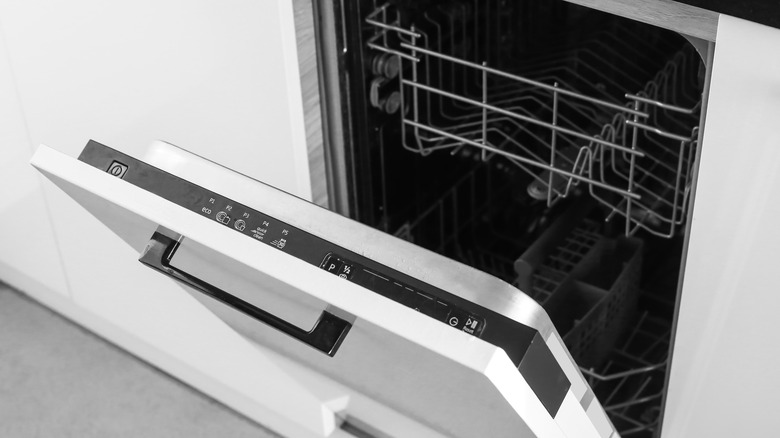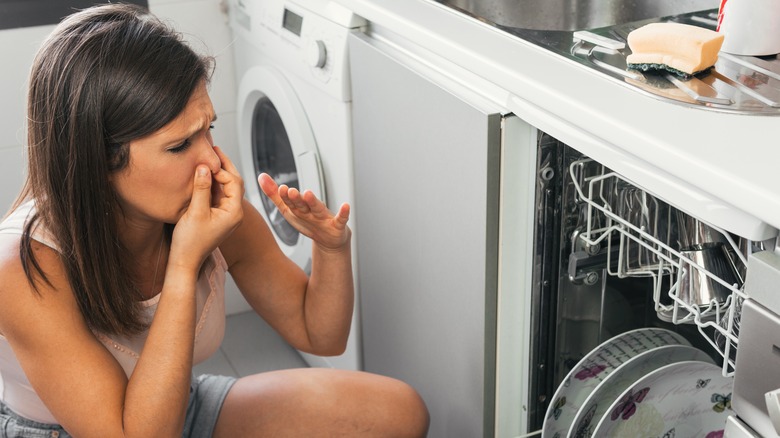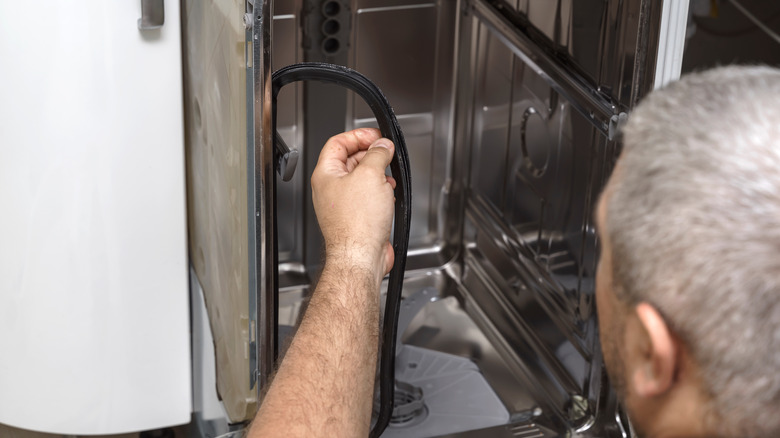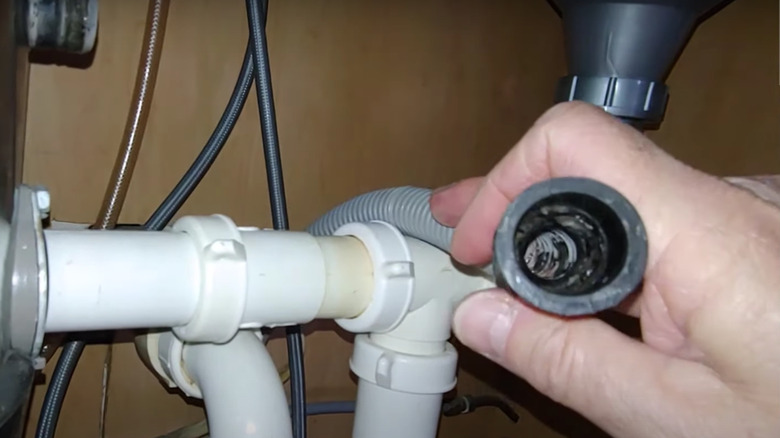An Expert Explains Why Your Dishwasher Smells Bad
The right dishwasher can be an absolute time saver for your daily kitchen cleanup, however, just like any appliance around the home, a dishwasher has its limits. Luckily, it tends to be a very expressive unit and there will likely be some telltale signs when something is running amuck. For instance, if a large amount of water collects at the bottom of the machine after it has run through a cycle, then your drain hose could be clogged, according to How Stuff Works. If your unit is leaking, that might be caused by an overload of dishes.
So, what do you do if your dishwasher is starting to smell bad? This can be concerning, especially if this odor is happening after you've put your dishes through a cleaning cycle. To get you the answer on how to assess the problem and what you can do to fix it, we went straight to a professional. In an exclusive House Digest interview, we asked Jim Schmid, owner of Diamond Factory Service in Wisconsin, to explain the causes of a smelly dishwasher, and he offered up some helpful advice right out of the gate. "Make sure you're running regular maintenance cycles on your dishwasher to help prevent bacteria from building up inside and creating awful odors," he says.
Food and grease buildup
If you're detecting a funky odor from your dishwasher, it could be the result of a few problems. Although fairly minor in the early stages, you want to tackle these issues immediately before they lead to any major difficulties. "Over time, food particles and grease accumulate on the interior surfaces of the appliance and start to produce an unpleasant odor," says expert Jim Schmid. "If left unattended, this problem can get worse and eventually make your dishwasher smell like rotten eggs or sour milk." One sure way to stop bits of food from reaching your dishwasher is to properly scrape off any leftovers from your dishes and give them a quick rinse in your sink before placing them inside.
Another way Schmid suggests you can prevent this unpleasantness from occurring is to "clean your dishwasher regularly by running an empty cycle with a dish detergent." Each unit has its own clean cycle function which should be run at its highest temperature. "Additionally, you may want to throw in some vinegar or baking soda before running each cycle to help deodorize the interior surfaces," he notes. "Cleaning out any visible food or grease buildup with a damp cloth will also help reduce the smell from inside your machine."
Faulty door seals
Yet another cause of terrible smells emanating from your dishwasher could be a breakdown in the rubber lining of the appliance door or the door gasket itself. A door gasket is the tight fitting rubber seal that surrounds the upper and lower part of your dishwasher. This seal helps to prevent water from leaking out of the machine while it's running through a cleaning cycle. Jim Schmid tells us, "The rubber seal around the door may become cracked or worn down, allowing food particles and grease to accumulate within." If left to rot, these particles are sure to lead to some seriously unpleasant odors.
Per Schmid, "To avoid this, inspect the seals around the dishwasher's door for any damage at least once a month. If you spot any cracks or tears in the rubber, then it's probably time to replace them with new ones." New rubber seals are fairly inexpensive, you just need to match them to the same make and model as your current dishwasher. For the avid DIYers, you can perform the task yourself by carefully removing the old seal and replacing it with the new one. Of course, if the job seems too daunting then be sure to call an appliance professional for help.
Clogged drain hose
Clogs can be one of the main reasons that your dishwasher is not running smoothly. Bits of leftover food and gunk tend to make their way into every nook and cranny of your appliance causing blockages and, eventually, a noxious smell. Along with cleaning out the catch basin which is designed to stop particles from traveling through the hose of your machine, you may want to consider looking for any other points where food can be trapped. "Inspect your dishwasher's drain hose every once in a while to make sure it isn't clogged or blocked by any debris," recommends expert Jim Schmid.
The drain hose is responsible for passing the soapy water out of your machine at the end of a cleaning cycle. "You might want to try running hot water through the hose before each cycle to help dislodge any stuck-on food particles or grease buildup," Schmid suggests. "In some cases, you may want to take apart the hose and clean out any visible blockages with a damp cloth for maximum efficiency." If the problem is even more extreme, you may need to remove the hose so you can use pliers or a small drain snake to deal with the blockage.



